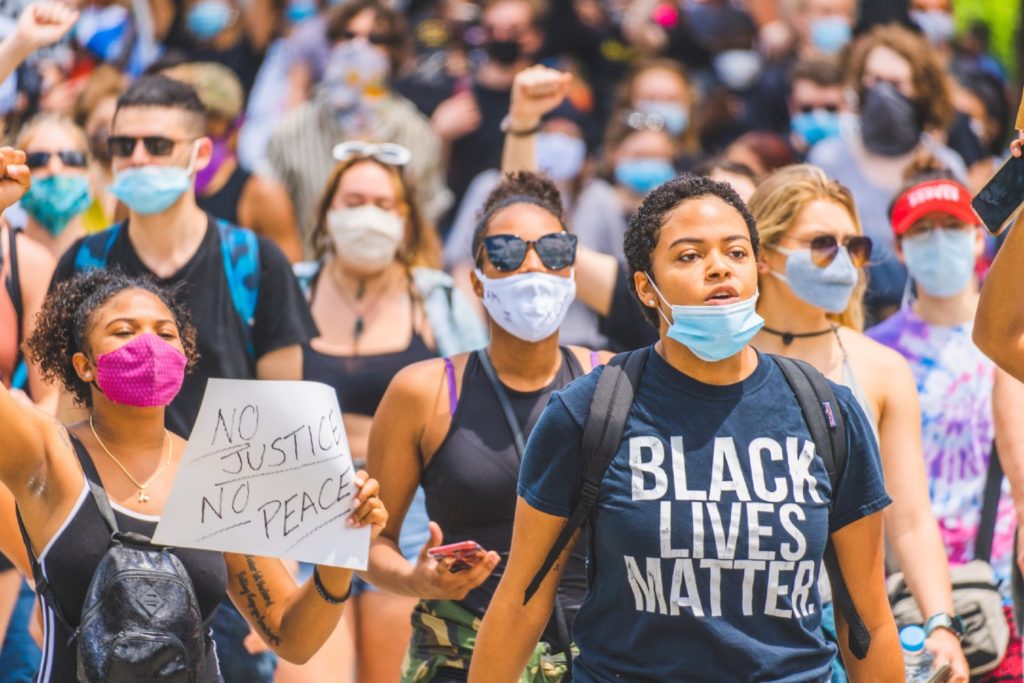Saying I despair has never felt so futile. Despair seems cheap. It is a luxury. Every news story and update I read on the weekend confirmed as much. Every image capturing the anger and hostility and desperation in America at this point in history reinforced it.
As a white middle-class woman living in suburban Sydney in 2020 my privilege has never felt more ostentatious. From that pedestal virtue-signalling is insulting and humiliating.
It is tempting, then, to stay silent, to say nothing to avoid risking the insult of an empty declaration of concern.
But saying nothing is not the answer. Staying silent is an abuse of privilege. Saying nothing is only possible when your own life is not at stake. As Desmond Tutu famously said, “If you are neutral in situations of injustice you have chosen the side of the oppressor”.
I do despair but my words alone are cheap.
The brutal killing of George Floyd in Minneapolis last week at the hands of police is cause for despair. That a police officer kneeled on his neck and suffocated the 46 year old man to death is cause for despair. That three other police officers stood by and failed to intervene is cause for despair.
That this is not an isolated incident is cause for despair. That it is closer to the rule than the exception is cause for despair.
George Floyd’s killing has unleased fury and hurt and desperation among so many Americans, as growing protests around the country attest.
Australians are enraged and furious too. Yet, we cannot overlook the atrocious systemic racism right here. Australia’s treatment of First Nations people, and particularly by police, is cause for despair.
Black Lives Matter in Australia. No more Black deaths in police custody. @amymcquire https://t.co/YqNmCNXYzX
— Nazeem Hussain (@nazeem_hussain) May 30, 2020
It is tragically apparent that Black lives do not matter the way white lives do. They should but they don’t.
If you are uncomfortable with that, which I sincerely hope you are, we have a choice to make. Not being racist is not enough: being actively anti-racist is the only starting point.
Acclaimed professor, award-winning author & director of the Antiracist Research & Policy Center, Professor Ibram X. Kendi, describes being anti-racist here:
“No one becomes “not racist,”…we can only strive to be “anti-racist” on a daily basis, to continually rededicate ourselves to the lifelong task of overcoming our country’s racist heritage,” We have to educate ourselves. We can learn about covert white supremacy, follow organisations leading the way for racial equity and justice, watch films, listen to podcasts, and read books. This doesn’t need to be seen as a chore, but can instead be seen as an opportunity — an opportunity to better understand ourselves, love our neighbours, and become the change we wish to see.”
Being passive at this moment is, in effect, permitting the status quo. It is permitting a world in which Black lives don’t matter. Black lives matter.
George Floyd matters. Joyce Clarke matters. David Dungay matters. Ahmaud Arbery matters. Breonna Taylor matters. Kumanjayi Walker matters.
Being outraged and heartbroken is one thing, but without getting educated and informed and actively challenging the structures and attitudes that underpin racism – in Australia and elsewhere – even when it’s uncomfortable, the outrage and heartbreak is cheap.
For anyone for whom the despair is hypothetical because our lives and existences are not at stake it is time to not just recognise our privilege but use it. If we are not part of the solution, we’re part of the problem.



